For most of time, humans lived in a world where the power was consolidated into the hands of a few kings or queens. Then a few hundred years ago, with America leading the way, that shifted into more decentralized/democratic systems, and the power was spread out over the people. As a result, overall quality of life started to improve immensely. After 1776, America was the most decentralized governance system on Earth, and with that came lots of opportunity. People lined up from countries all over the world to move to America. They were not moving to America for the land, or for the people. No, they were moving for The American Dream: a chance to live inside a system that nurtured creativity, individualism, knowledge discovery, and freedom to choose one’s own path.
America’s system also had one of the most important factors working for it: the ability to error-correct. Critics like to argue that America wasn’t born perfect. That’s right, it wasn’t. No country ever was. But over time America corrected the mistakes it made such as slavery, the oppression of women, child labor, promoting cigarette smoking, toxic waste, and more.
But in the last 50 — and especially the last 20 years — all the power has begun to consolidate again. With that centralization has come more corruption, and we are losing the spirit of what America once was by not understanding how to solve this fairly simple problem: we need to re-decentralized America to protect it. We have all the tools - especially with the internet now - to do so and make America — and all countries — more impervious to corruption and the enemies of civilization.
So it’s important to examine what that truth means to us right now. What are the results of living under this re-centralization of power?
Remember…. results matter most.
The results right now are this: People with powerful centralized agendas have us on the brink of war. No institution seems trustworthy. Our government is corrupted. People don’t trust the media. People don’t trust the voting systems. People don’t trust medicine, science, food, academia or even language (what is a woman?). Right now we live in a world where people sit in laboratories making viruses more dangerous even though most of us agree that is a horrible idea. Right now we exist in a reality that despite technology evolving at such an amazing pace this century, all the people of Earth are getting sicker and sicker. That shouldn’t be happening in an aware society living under a good system. Technology should be helping us understand more, and live longer, happier lives. Something isn’t right. Something is obviously very corrupted.
The answer to all of it lies in the systems we allow to govern over our lives.
The number one most important factor for determining quality of life on Earth is this: What kind of systems do you live under?
Think about it. If you tell us what kind of systems you live under, chances are we can predict what kind of life you have. The problem is that right now the ways to corrupt our systems have outpaced the ways to protect them, so now whoever is doing the corruption has control. We need to find a peaceful way to take it back.
That’s why at The Society of Problem Solvers we relentlessly ask that we all zoom out our lenses, forget about the hot button issues that divide us all, and come together on this one issue: Let’s fix the systems that govern over our lives so we can then work on the individual problems better.
We should all have a healthy fear of the corruption that centralized power lures to itself, and the danger that poses to the members of any system (we the citizens). The time to resist this is right now, before it gets worse. There are only two kinds of systems: effective and ineffective. By nearly any metric, our current system seems to be losing efficacy at an alarming rate. So we need to have a sense of urgency, and do something about it.
Centralized power is always alluring to those who want to wield it. Like the ring in Lord of The Rings, profiteers and tyrants alike salivate over controlling centralized power. One ring to rule them all. The most effective way to curb this problem is with decentralization.
Think about it from the perspective of someone who is trying to hack, game or corrupt a system. In a decentralized one the hacker will only get the information of one person - one node of the system - if they are successful. In this scenario they will work extremely hard to get very little reward. But in a centralized system they will often get a massive cache of thousands of different people’s data, money, or goods. The risk is often the same but the reward for attacking the centralized system is greater. Thus, much more tempting.
We should be actively stopping corruption by continuously making our systems better. When was the last time this happened in America? We should be constantly asking ourselves: do these systems still hold accountable and dishonor people who attempt to corrupt them?
As people, we need to harness, amplify, and keep the power spread out over all of society with well-crafted new systems and tools to help us. We need to make sure all systems that govern over us are not corrupted or corruptible at mass scaling. To do that we need to use transparency to expose where the corruption points occur, and then fix them.
As an important caveat, there is one thing to pay attention to that gets kind of tricky. Often there are multiple systems working together. Some centralized, some decentralized, and some a fusion of the two systems. In any case, the system with the final say over the other ones holds all the power. Picture that hand-over-hand game you play with a baseball bat to see who bats first… the last hand on top wins. Now picture that with systems. If a centralized system controls a decentralized one - the centralized system has control of everything. If a decentralized system controls a centralized one, then it has the control.
We call this the “Last Hand on The Bat” theory of systems, which means the last system to control the others, controls the whole thing.
To understand this better let’s use government as an example. The centralized businesses in America were supposed to be kept in check by the centralized entity of government. Government was supposed to act as a referee between business and people, and people and each other, and for a while it did that safely. This was only safe because the decentralized power of the people working together en masse voting had the final say. So the controlling system —the last hand on the bat — for a long time was the decentralized voters.
But is that still the case?
If the systems of voting are corrupted in any way, then that would mean that the whole system is corrupted. Why? Because the people with the final hand on the bat here would now be the centralized ones who were corrupting the system, and no longer the decentralized voters.
At The Society of Problem Solvers we believe that the best problems to solve are the root problems, the ones deep under other ones. In this case, that problem appears to be the trust that has eroded within the systems.
If we ignore the hot button issue of “stolen elections” for a second, and just honestly and scientifically examine the current American trust in the voting system, how does it score? Trust is low. When you have elected officials in 2016 saying that the system was rigged when Trump won, then now again the opposite in 2020 and 2022 when Biden wins, that says something.
Add to that the obvious fact that money in politics controls politicians and sways elections, and it is clear that trust in the entire system is failing. Most people now believe that it is no longer the decentralized voters in control. It is the centralized corporations and the people colluding to corrupt our systems who are.
What we need to repair first is trust. Good decentralized systems require trust. It is an absolute. And the best way to start to get there is with transparency.
Another good example is look at what happened last year in the crypto currency realm. Crypto itself - if correctly decentralized (like Bitcoin is) - is very very very hard to corrupt. While nothing is impossible, Bitcoin has never been successfully hacked or counterfeited (at least to our knowledge at the time of this writing). But, as we all know, last year a centralized entity - an exchange - got control of the decentralized currencies (using individual keys) and corrupted the system. The control went back to the centralized people at FTX and their cronies. How? They took advantage of the trust (there’s that word again) the traders had given them.
This should be a lesson to all of us: Always fight to have the last hand on the bat. For systems of crypto, that means hold your keys on a cold wallet. For systems of government, that means the people. If we the people - the decentralized entity - have the final say in all systems, then corruption will be much more difficult.
Imagine a new paradigm- making our own consensus and problem-solving systems that plug into the current ones that will give us better decentralized control in the end - like we have talked about so many times before such as here, here, here, and here (and a bunch more).
Don’t lose faith in voting. Don’t lose faith in Bitcoin. Both can have their trust reestablished by understanding and improving the systems they are in. In fact Bitcoin and all of crypto error-corrected and began using decentralized or more transparent exchanges after the FTX fraud. Humans are fallible, and bad actors will always try to corrupt our systems. But as long as we keep error-correcting it will progress. We have stopped doing this for our systems of governance, and we can change all of that by deciding to do so now.
America’s situation right now is our own fault for putting the trust in the wrong type of system - a centralized power. There is absolutely no excuse not to have transparent, open sourced, and difficult to corrupt systems in place to help us run governments.
So let’s build them.
Anyone who has read the book The Starfish and The Spider (that we often recommend such as here) knows that if decentralized entities are prepared to fight back then they only get stronger when attacked. Think about what happened when the US government tried to shut down Napster back in the day. New, more-decentralized platforms popped up everywhere (Kazaa, Morpheus, etc). Or when CNN and MSNBC and FOX tried to smear podcasts and Substack and video platforms, they only became stronger and now Legacy media is all but dead.
Understanding decentralized systems might be easier with an infographic, such as this
At the Society of Problem Solvers we like to think about this:
Even recently, Canadian citizens were making a big push to use direct democracy and technology on blockchain to hold their representatives accountable. Like so:
This is exactly the kind of thinking we need. Parallel systems. Decentralized systems, Transparent systems. New systems that we build ourselves and control ourselves. We need a place to block out the noise and propaganda and have serious talks once again.
We have all the tools we need to fix our systems right now such as collective intelligence, blockchain, think tanks, and decentralized problem-solving systems like we wrote about HERE and HERE.
We just need to decide that it is time to decentralize once again, and snuff out corruption before the reverse happens.
Thank you for reading!
Please join our think tank message board at SwarmAcademy.ai where we continue conversations like this one.
Thank you to all of the writers that make this possible. We are always accepting guest writers, so if you have an idea for a solution, please reach out. Let’s solve it all, together.
For over 3 billion years on this planet there were only single-celled organisms. Then one day they somehow learned to work together and make complex multi-celled creatures . Right now we are like those single-celled organisms. Our next evolution is finding how to work together, better… (like we wrote about here).
#SwarmAcademy #LEADERLESS #ResultsMatterMost #DecentralizeEverything #DemandTransparency
COMMENTS ARE FOR EVERYONE AS A PLACE TO THINK-TANK SOLUTIONS. They will never be for paid-only subscribers and we will never charge a subscription.

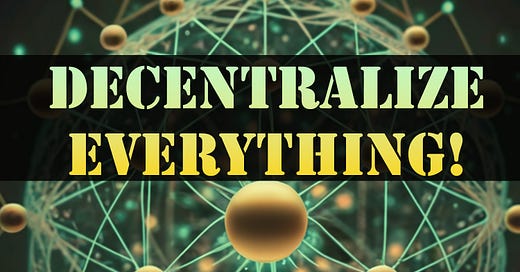



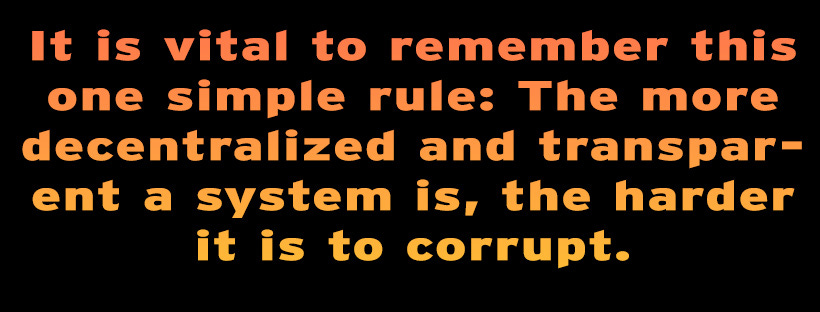
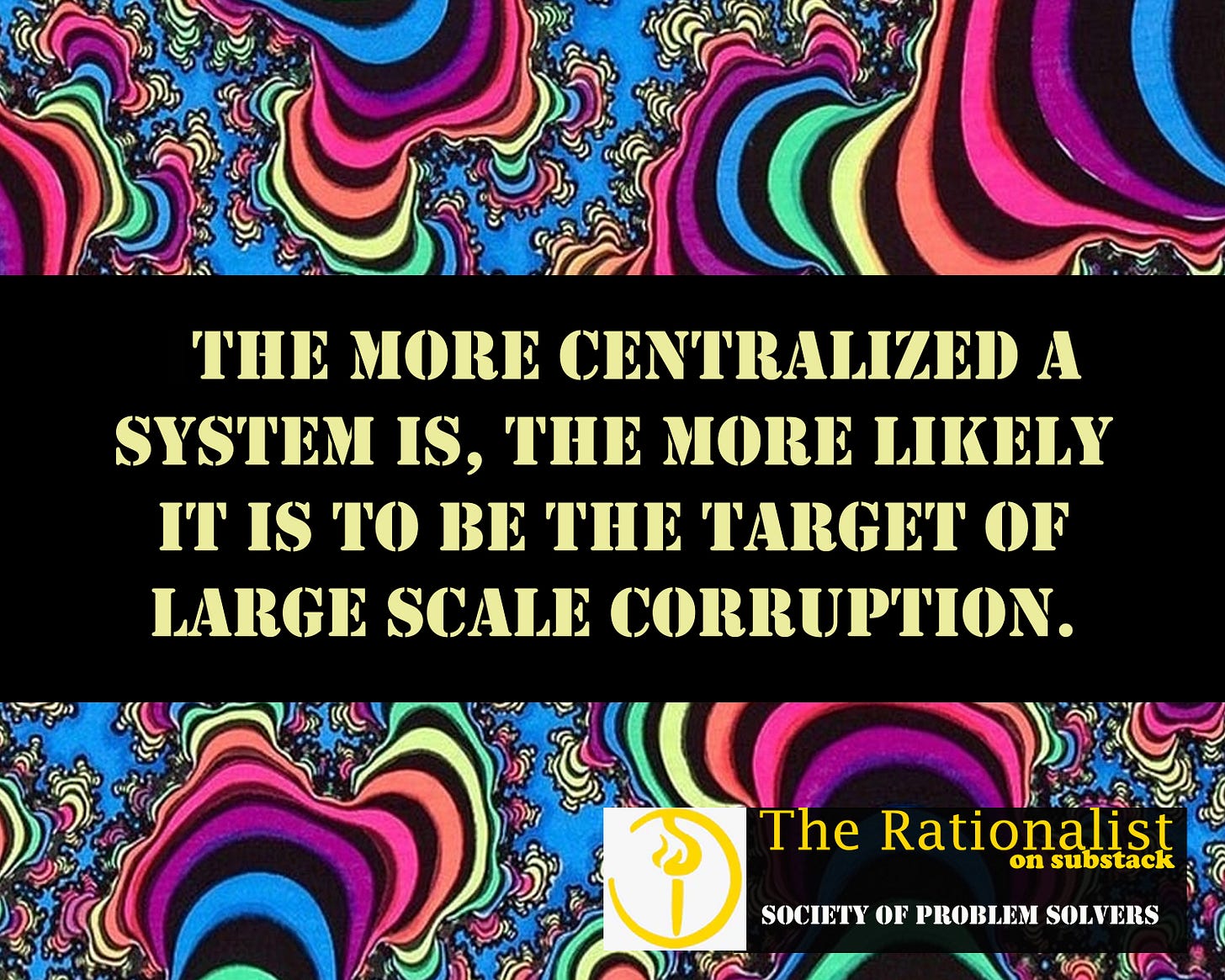


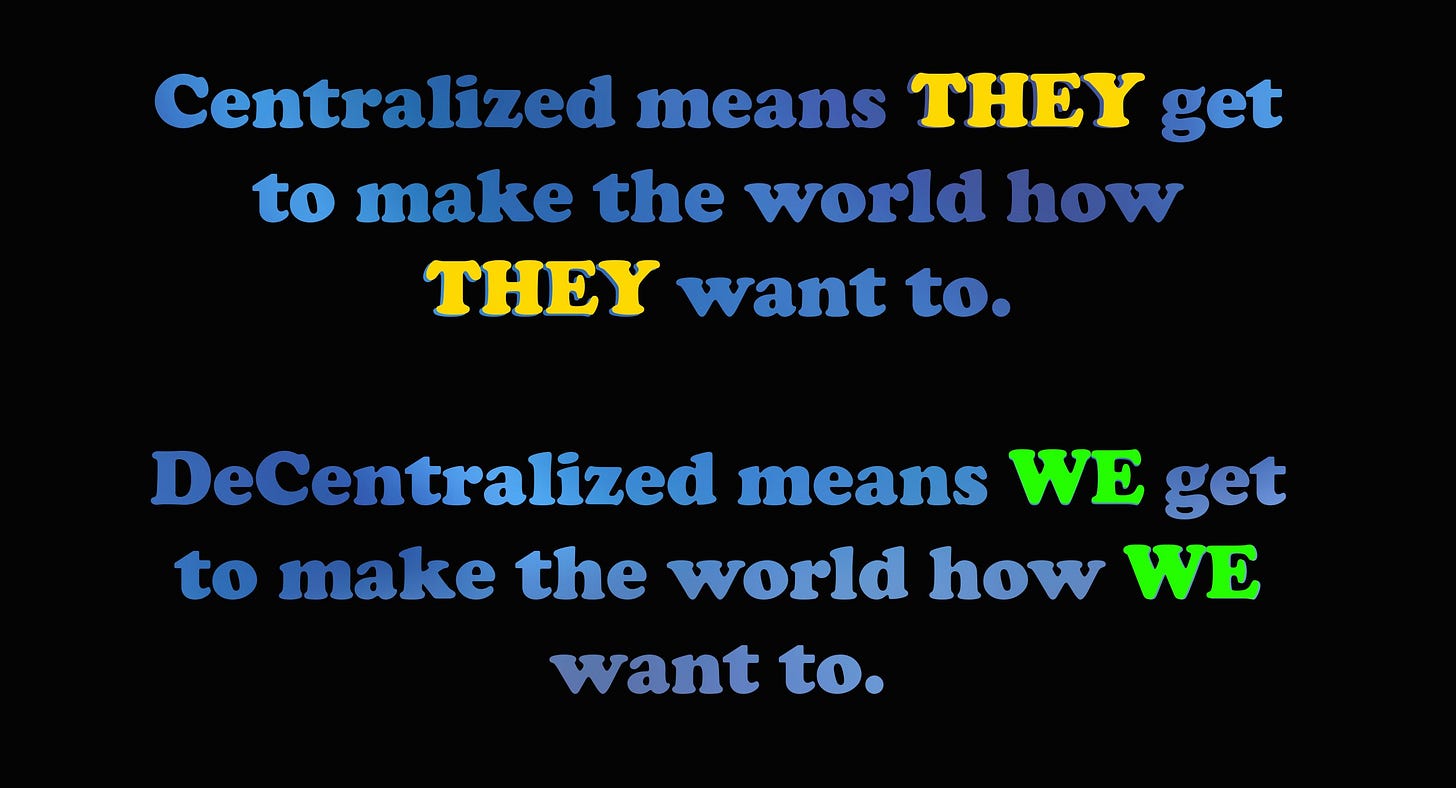
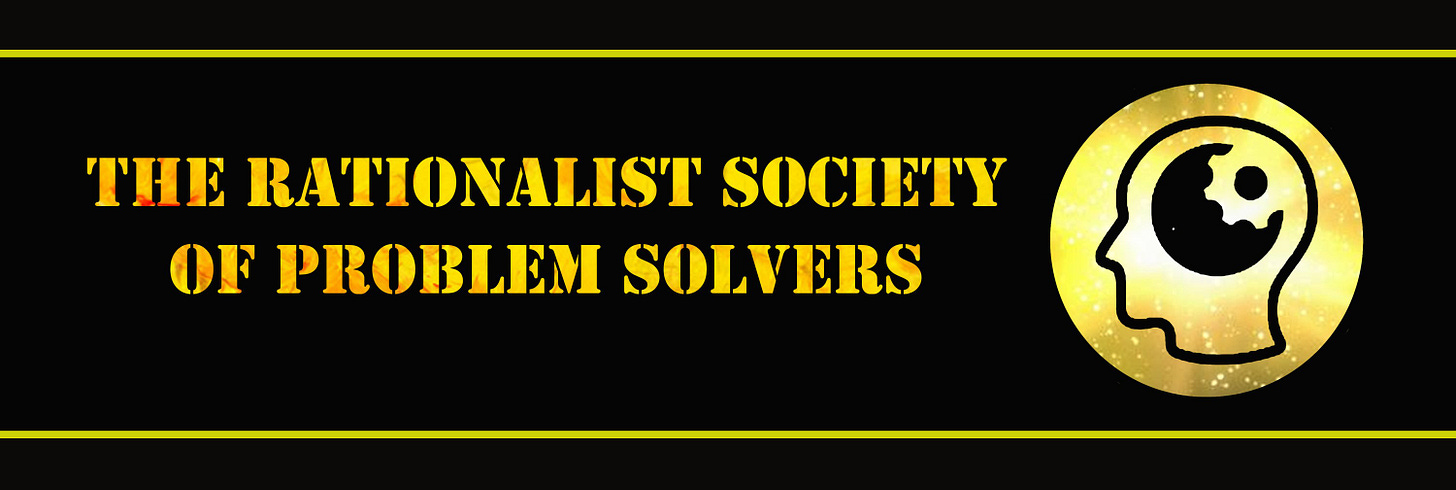
This made me think of a client I had the other day. She works for the FBI doing Medicare fraud investigations and says a fraud wont even hit their radar unless it’s over a million dollars. The thought that the more centralized a function is, the more ripe is it for corruption is certainly true.
Something else changed around 1776. The world passed one billion living souls and did not fall back to 500 million. And it has not stopped. Too few people are in charge. Judges ought to be panels of 5, for every judicial event. Time for an end to monarchs, presidents, and singular power points.